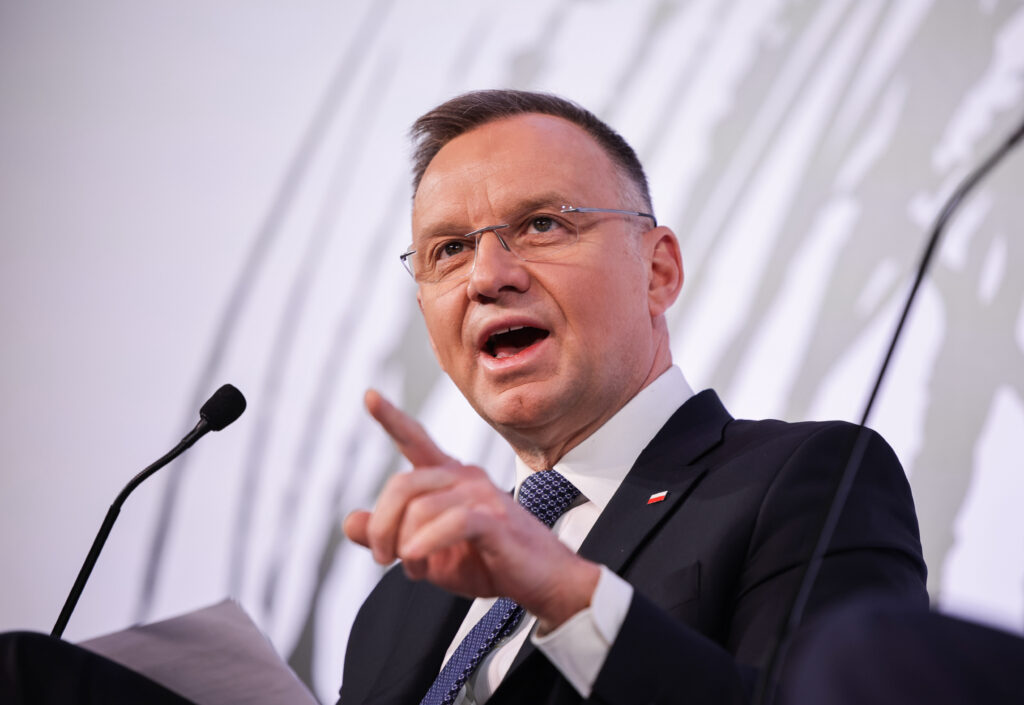Watch the panel
“We need development. And one of the most important factors for that development is connectivity,” said Polish President Andrzej Duda on January 17 at the Atlantic Council’s Three Seas Hub on the sidelines of the World Economic Forum in Davos, Switzerland. Duda spoke alongside Lithuanian President Gitanas Nausėda, Latvian President Edgars Rinkēvičs, and Croatian Prime Minister Andrej Plenković as the heads of state took stock of the Three Seas Initiative at age nine, with an eye toward what’s next for the group at a time of war and uncertainty.
The Three Seas Initiative, established in 2015 by Duda and Croatia’s then President Kolinda Grabar-Kitarović, is a forum of thirteen European Union (EU) member states running north to south from the Baltic to the Black and Adriatic seas. The initiative is dedicated to advancing connectivity, security, and foreign investment in the Central and Eastern Europe region.
The initiative’s founding mission “to establish north-south access” in Central and Eastern Europe required “a visionary approach,” said Nausėda. Today, amid Russia’s full-scale invasion of Ukraine that has led to Moscow’s isolation, “it’s very important to replace west-east access with north-south access.”
Below are more highlights from this discussion, which was moderated by Atlantic Council President and CEO Frederick Kempe.
Integrating Ukraine
- When it comes to cooperating on projects under the Three Seas Initiative, Nausėda said, “I am looking not only at the member states of the European Union,” but also potential future members of the bloc—especially Ukraine and Moldova. The initiative’s agenda is “also about the recovery and reconstruction of Ukraine,” said Nausėda, who will host the next Three Seas Summit and Business Forum on April 11 in Vilnius.
- Building more infrastructure and increasing connectivity also has implications for Ukraine’s war effort. “We need excellent infrastructure, motorways, railways to deliver military equipment” to Ukraine, said Duda.
- Ukraine and fellow EU candidate Moldova were made associate states of the initiative at the Three Seas Summit in Bucharest last September. Membership in the initiative is reserved for EU member states, and there is no plan to change this rule, Duda said. However, he said, “We hope Ukraine will be a full member of Three Seas Initiative because we all support Ukrainian efforts to join the European Union.”
Jumpstarting investment
- Nausėda said the initiative needs to make its projects “economically interesting” to private businesses and foreign investors. “Otherwise it will be very difficult to implement these projects” only with state and EU resources, he said. “Those are also important, but they cannot cover all the financial gaps we have with the Three Seas Initiative.”
- Looking at ways the initiative can attract more outside investment, Plenković said that “we should all strengthen our judiciary. We should all fight corruption.”
- “It will take several multi-annual financial frameworks and investments” to attain the level of economic development of the EU’s founding members, said Plenković. “And this catching up policy is not something you can do overnight.”
Raising ambitions
- The countries in the initiative “need to get more attraction also outside this region” to increase foreign investment, said Rinkēvičs. “While there is a profound interest” for cooperation within the Three Seas region, he said, “there is also an interest to attract more investment, trade relations with the outside world.”
- There is also room to increase security cooperation with outside countries, including the United States, through the Three Seas Initiative, argued Rinkēvičs. “When we talk about military security, energy security, cyber security, we need to put more effort into working with our transatlantic partners,” he said.
Daniel Hojnacki is an assistant editor on the editorial team at the Atlantic Council.
Watch the full panel
Image: Andrzej Duda, President of Poland, speaks at the "Ukrainian Breakfast 2024" event at the World Economic Forum (WEF). The continuation of the annual meeting of the World Economic Forum is considered one of the most important meeting places for top politicians, top managers and scientists. Debates and confidential meetings focus on solutions to global challenges.
